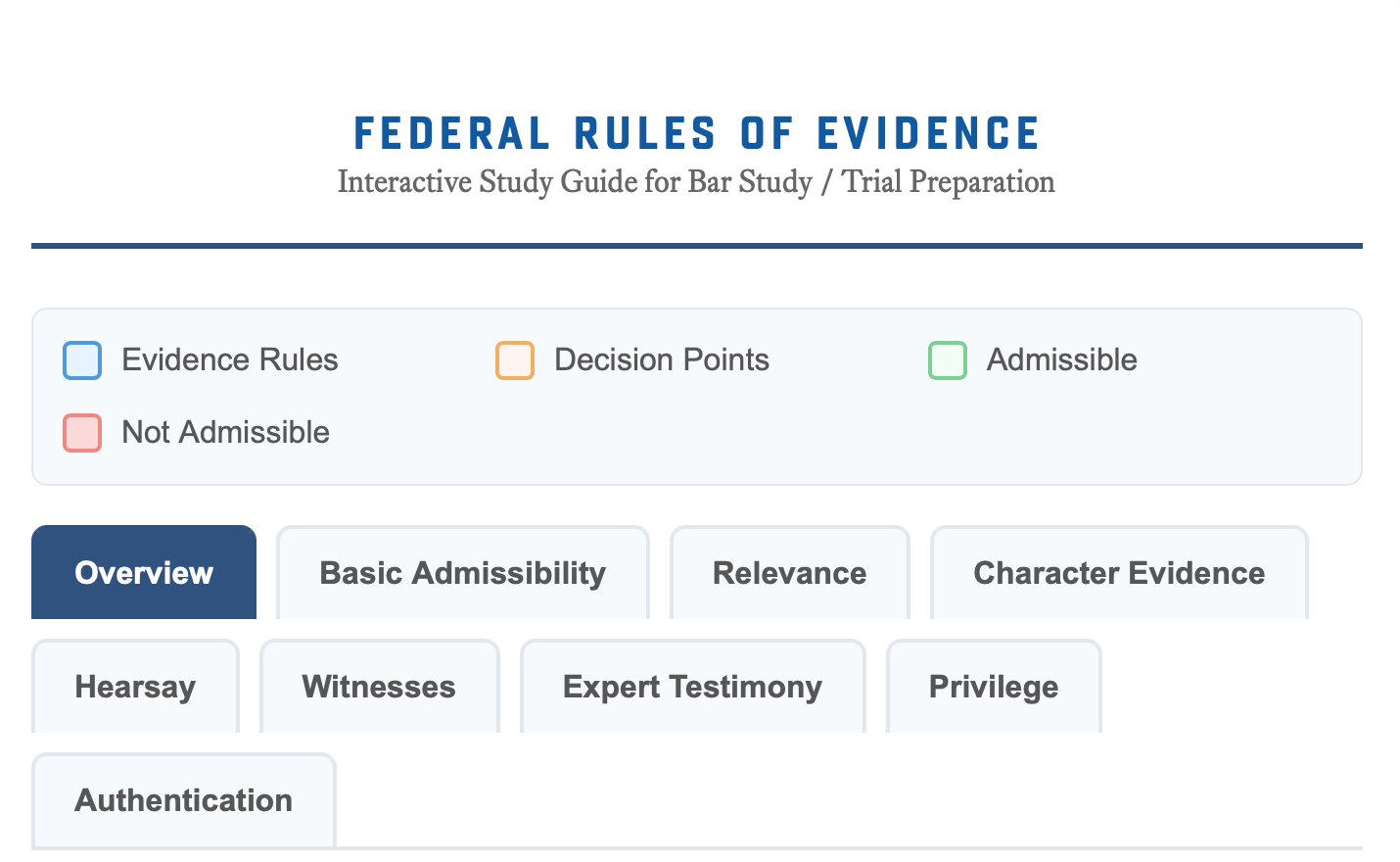Overview
Basic Admissibility
Relevance
Character Evidence
Hearsay
Witnesses
Expert Testimony
Privilege
Authentication
Federal Rules of Evidence - Complete Structure
Article I
Rules 101-106
General Provisions
Article II
Rule 201
Judicial Notice
Article III
Rules 301-302
Presumptions
Article IV
Rules 401-415
Relevance & Limits
Article V
Rules 501-502
Privileges
Article VI
Rules 601-615
Witnesses
Article VII
Rules 701-706
Opinions & Expert Testimony
Article VIII
Rules 801-807
Hearsay
Article IX
Rules 901-903
Authentication
Basic Evidence Admissibility Framework
Evidence Offered
Rule 402
↓
Is it relevant?
Rule 401
↓
NO
Not Admissible
Rule 402
YES
Continue Analysis
↓
Is it excluded by any rule?
Rules 403, 404-415
↓
YES
Not Admissible
NO
Continue Analysis
↓
Is there a privilege?
Rules 501-502
↓
YES
Not Admissible
NO
Continue Analysis
↓
Is it hearsay?
Rules 801-807
↓
YES
Exception applies?
NO
Continue Analysis
↓
Is it authenticated?
Rules 901-903
↓
NO
Not Admissible
YES
ADMISSIBLE
Relevance Analysis (Rules 401-403)
Rule 401: Test for Relevant Evidence
Does evidence have any tendency to make a fact more/less probable?
↓
Two-Part Test:
1. Material to case?
2. Probative value?
↓
NO to either
Irrelevant
Not Admissible
YES to both
Relevant
Rule 402
↓
Rule 403: Balancing Test
Probative Value vs. Prejudicial Effect
↓
Does probative value substantially
outweigh danger of:
• Unfair prejudice
• Confusing issues
• Misleading jury
• Undue delay
• Waste of time
↓
NO
Excluded under Rule 403
YES
Admissible
Character Evidence (Rules 404-406, 412-415)
Rule 404(a): General Prohibition
Character evidence generally not admissible to prove conduct
↓
What type of case?
↓
Civil Case
Rule 404(a)(1)
Generally prohibited
Criminal Case
Rule 404(a)(2)
Limited exceptions
↓
Criminal Case Exceptions:
• Defendant's character (if opened)
• Victim's character (if relevant)
• Witness character (Rules 607-609)
↓
Rule 405: Methods
Reputation/Opinion
Specific Acts (limited)
Rule 406: Habit
Always admissible
(routine practice)
Rules 412-415
Special Rules:
Sex offenses, etc.
Hearsay Analysis (Rules 801-807)
Rule 801: Definitions
Statement by declarant, offered to prove truth of matter asserted
↓
Three-Part Test:
1. Statement?
2. Made by declarant?
3. Offered for truth?
↓
NO to any
Not Hearsay
Admissible*
YES to all
Hearsay
↓
Rule 802: General Rule
Hearsay not admissible unless exception applies
↓
Check for exceptions:
↓
Rule 803
Exceptions regardless
of declarant availability
(24 exceptions)
Rule 804
Exceptions when
declarant unavailable
(6 exceptions)
Rules 805-807
• Multiple hearsay
• Attacking credibility
• Residual exception
↓
No Exception
Not Admissible
Exception Applies
Admissible
Witness Rules (Article VI)
Rule 601: Competency
Every person competent unless rules provide otherwise
↓
Rule 602: Knowledge
Personal knowledge required
(except experts)
Rule 603: Oath
Obligation to testify
truthfully
Rule 605-606
Judge/Juror
disqualified
↓
↓
Rule 607: Who May Attack
Any party may impeach
any witness
Rule 608: Character
Reputation for
truthfulness
Rule 609: Convictions
Criminal convictions
(with limitations)
↓
Rule 611: Control
Court controls mode
and order
Rule 612: Writings
Refreshing memory
Rule 613: Prior Statements
Inconsistent statements
Expert Testimony (Rules 701-706)
Type of Opinion Testimony?
↓
Rule 701: Lay Opinion
• Rationally based on perception
• Helpful to jury
• Not scientific/technical
Rule 702: Expert Opinion
Qualified expert with
specialized knowledge
↓
Rule 702: Expert Requirements
↓
Qualification:
Knowledge, skill,
experience, training,
education
Reliability:
• Sufficient facts/data
• Reliable principles
• Reliably applied
↓
Will testimony help trier of fact?
↓
Rule 703: Bases
Facts expert has been
made aware of
Rule 705: Disclosure
May state opinion
without disclosing basis
Rule 706: Court's Expert
Court may appoint
own expert
↓
Requirements not met
Not Admissible
All requirements met
Admissible
Privilege (Rules 501-502)
Rule 501: Privilege in General
Common law governs unless federal statute/Constitution/Supreme Court rule
↓
What type of case?
↓
Federal Question
Federal common law
privileges apply
Diversity/State Law Claim
State privilege law
applies
↓
↓
Attorney-Client
Confidential communications
for legal advice
Work Product
Materials prepared
for litigation
Others
• Doctor-Patient
• Spousal
• Clergy
↓
Rule 502: Attorney-Client/Work Product Waiver
Protections against waiver
Authentication & Identification (Rules 901-903)
Rule 901: Authenticating Evidence
Proponent must produce evidence sufficient to support finding
that item is what proponent claims
↓
Rule 901(b): Examples of Authentication
↓
Testimony
• Witness with knowledge
• Nonexpert opinion
• Expert comparison
Distinctive Characteristics
• Appearance/contents
• Patterns/markings
• Chain of custody
Other Methods
• Voice identification
• Telephone calls
• Public records
↓
Rule 902: Self-Authentication
Certain items require no
extrinsic authentication:
• Public documents
• Certified records
• Newspapers
Rule 903: Subscribing Witness
Not necessary to call
subscribing witness
↓
Authentication insufficient
Not Admissible
Authentication sufficient
Proceed with other rules
Social Sharing Image: Screen Shot of the FRE - Interactive Guide.
Credits: This blog article was written by James D. Ford Esq., GAICD CIPP/US CC | Attorney-at-Law, Blue Ocean Law Group℠.
State of California Bar Number: 346590
Important Notice:
This blog article is intended for general interest + information only.
It is not legal advice, nor should it be relied upon or used as such.
We recommend you always consult a lawyer for legal advice specifically tailored to your needs & circumstances.



Your comment has been received and we will approve it shortly.